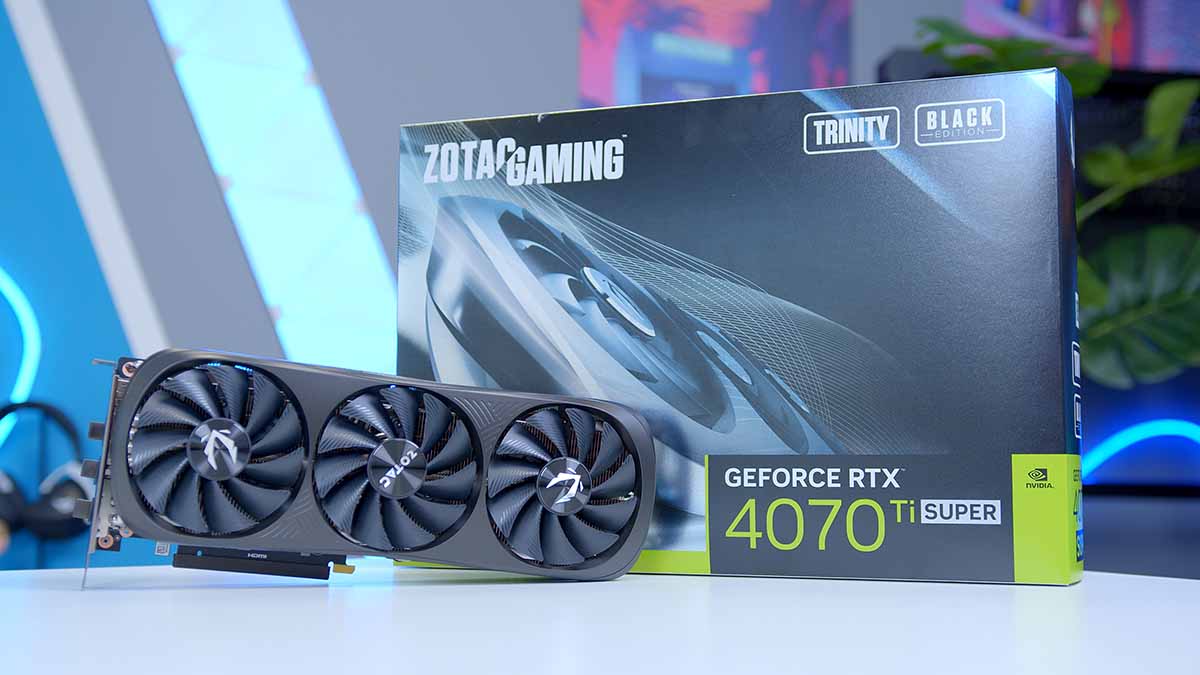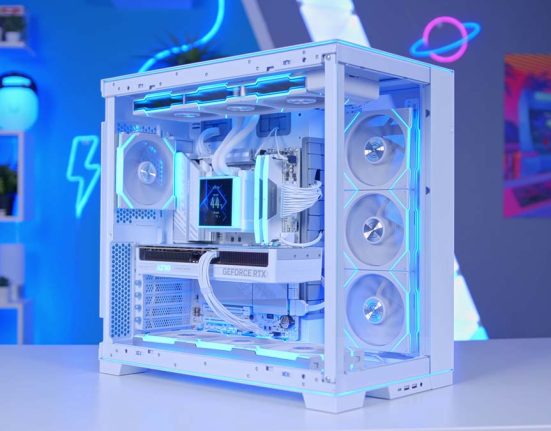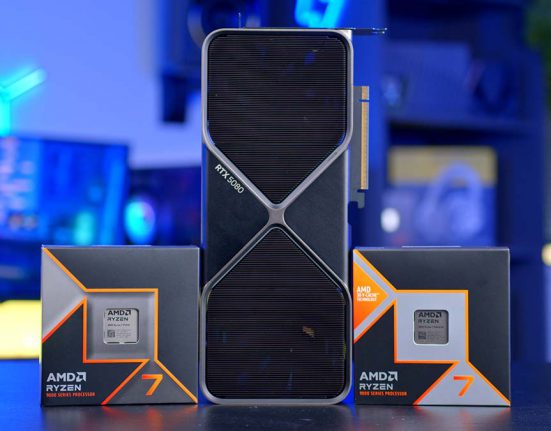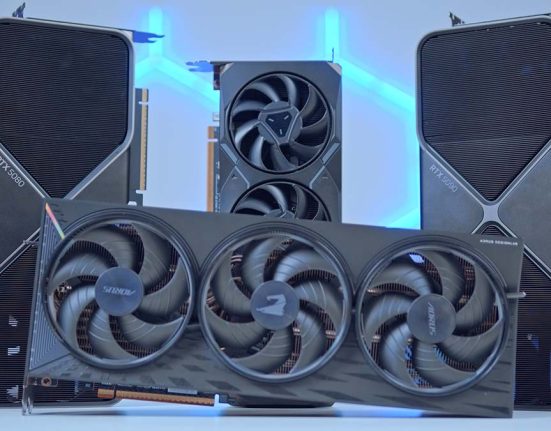Those looking to pick up a new graphics card for 1440p gaming have access to a myriad of options. Through a number of technological advancements, building a 1440p capable gaming PC is possible, and the options are more bountiful than they’ve ever been.
With both NVIDIA and AMD competing to dominate the 1440p market, we’re constantly seeing new graphics cards being pumped out to accommodate the demand of buyers. And NVIDIA’s RTX 4070 Ti SUPER looks to meet this demand head on, rivalling the likes of RX 7900 XT from AMD.
Launching exactly a week after the RTX 4070 SUPER, the RTX 4070 Ti is a high-end alternative facing a mid-life refresh, along with the RTX 4080 SUPER. NVIDIA’s Ada Lovelace architecture is an impressive feat of engineering, showing that NVIDIA’s RTX 4000 range has a very strong foundation to build upon.
And this fully explains why NVIDIA are looking to take advantage of this hardware with new and improved graphics cards. In today’s review, we’ll be taking a look at Zotac’s Gaming RTX 4070 Ti SUPER Trinity Black Edition, assessing performance within a range of gaming benchmarks. We’ll be evaluating the value proposition of this card to see how it holds up against the rest of the market alternatives.
Buy the Zotac Gaming RTX 4070 Ti SUPER Trinity Black Edition on:
Specifications
The RTX 4070 Ti SUPER bolsters core counts and clock speeds, memory bus, but more importantly VRAM capacity, when compared to the original RTX 4070 Ti. This is the most notable change to the hardware, and explains why the price hasn’t dropped versus the standard RTX 4070 Ti model.
VRAM has become the major sticking point within the PC gaming space, due to a number of new titles demanding significantly more than the typical 8GB norm that we’re used to. This makes the RTX 4070 Ti SUPER a rather tantalising option as the increased bus width and VRAM capacity will provide better performance at higher resolutions (primarily 1440p), but also offers more longevity in newer titles.
In terms of the specifics, the RTX 4070 Ti SUPER offers around a 10% increase in CUDA cores, going from 7680, to 8448. Tensor and RT cores have also seen a small increase, with a rise to 240 and 66 respectively. Despite these improvements, power draw has remained the same at 285W.
| Specification | Zotac Gaming RTX 4070 Ti SUPER Trinity Black Edition |
|---|---|
| Video Memory | 16GB GDDR6X |
| Memory Bus | 256-bit |
| Core Clock Speed | 2.34GHz |
| Boost Clock Speed | 2.61GHz |
| CUDA Cores | 8448 |
| RT Cores | 66 |
| Tensor Cores | 264 |
| Power Consumption | 285W |
| GPU Length | 306mm |
| MSRP | $799 |
It is worth addressing that the boost clock speed will differ dependent on the card that you’ve chosen. The RTX 4070 Ti SUPER does not have a Founders Edition model, so manufacturers have the opportunity to increase speeds even for MSRP cards. As a general rule of thumb most non-OC MSRP graphics cards aren’t normally overclocked, but take this with a pinch of salt.
| Spec | RTX 4070 Ti | RTX 4070 Ti SUPER | RTX 4080 |
|---|---|---|---|
| Video Memory | 12GB GDDR6X | 16GB GDDR6X | 16GB GDDR6X |
| Memory Bus | 192-bit | 256-bit | 256-Bit |
| Core Clock Speed | 2.31GHz | 2.34GHz | 2.21GHz |
| Boost Clock Speed | 2.61GHz | 2.61GHz | 2.51GHz |
| CUDA Cores | 7680 | 8448 | 9728 |
| RT Cores | 60 | 66 | 76 |
| Tensor Cores | 240 | 264 | 304 |
| Power Consumption | 285W | 285W | 320W |
| MSRP | $799 | $799 | $1199 |
What is the RTX SUPER Refresh?
NVIDIA’s RTX SUPER range of cards first arrived after the initial RTX 2000 series back in July of 2019. Three of the RTX 2000 cards were given a mid-life refresh with improvements to the hardware, and a rebrand to ‘SUPER’ GPUs. RTX 4000 cards are seeing a similar treatment, but some different models are receiving an upgrade.

The RTX 4070, RTX 4070 Ti, and RTX 4080 have received SUPER refreshes, with various improvements to the specs, along with pricing adjustments too. There are rumours that we might see another SUPER card of some description, but there’s no official confirmation of this as of yet.
Most buyers will be pleased to hear about the pricing changes. The RTX 4080 SUPER is dropping to $999, with the existing RTX 4070 sitting at $549 instead of its near $600 price point.
| Model Name | MSRP |
|---|---|
| RTX 4060 | $299 |
| RTX 4060 Ti 8GB | $399 |
| RTX 4060 Ti 16GB | $499 |
| RTX 4070 | $549 |
| RTX 4070 SUPER | $599 |
| RTX 4070 Ti | $799 |
| RTX 4070 Ti SUPER | $799 |
| RTX 4080 | $1199 |
| RTX 4080 SUPER | $999 |
| RTX 4090 | $1599 |
It would be good to see a price drop on the RTX 4070 Ti SUPER, but we can understand that NVIDIA are trying to recoup costs based on the more significant hardware changes that this card features. Despite this, the RTX 4070 Ti SUPER looks to be a solid competitor versus the RX 7900 XT, especially when ray tracing and DLSS are thrown into the mix.
Design
There are a number of RTX 4070 Ti SUPER graphics cards and we’ve done a full roundup that highlights the key differences in our Best RTX 4070 Ti SUPER GPUs article. However, the priority of this review is Zotac’s Gaming Trinity Black Edition, a triple-fan option that sits at MSRP.
Because there’s no Founders Edition card, triple-fan models are more common, so stronger cooling is a feature that more buyers will be able to leverage at MSRP. The thermal capability of this Zotac Gaming Trinity variant is particularly strong thanks to the IceStorm 2.0 cooling system that this card uses.
The deepened fan shroud, and counter-rotating centre fan provide stable airflow while minimising noise levels. The fans will automatically shut off when the GPU is idle, resulting in highly controlled noise levels.

In terms of aesthetic, the Zotac Gaming RTX 4070 Ti Trinity is a fully black card, sporting a smooth shroud along with black fans too. Lining the top and bottom of the card, you’ll find two RGB lighting strips. There are three other zones of RGB lighting at the top, rear, and side of the card, providing some additional flair for your system.

All of the lighting can be fully customised within Zotac’s FireStorm software, allowing you to amend any lighting effects or change the colours. This Zotac Gaming variant is one of the fancier cards, and is perfect for those looking to spice up the look of their PC build.
On the size front, the Zotac Gaming Trinity is a somewhat larger GPU when compared to the vast majority of Founders Edition models. Sitting at 306mm in length, there is some clear heft to this card. However, in terms of clearance, you shouldn’t have any problems in most modern cases.

Overall, the Zotac Gaming Trinity Black Edition variant of the RTX 4070 Ti SUPER is a rather flashy card that many buyers will appreciate. The clean black tone situated around the card, followed by plenty of RGB lighting makes this GPU a worthwhile pickup if you’re looking to spice up your build.
Performance
In order to assess the performance capability of the RTX 4070 Ti SUPER, our in-house benchmarker, Harry Coleman, has put this Zotac Gaming variant through the wringer. We’ve done this with a plethora of gaming benchmarks, which includes a massive dataset of other competitor cards, allowing us to compare the RTX 4070 Ti SUPER to a range of other models. We’ve also created a table below that highlights the some worthy alternatives to keep an eye on too.
| GPU Name | Availability |
|---|---|
| AMD Radeon RX 7800 XT | $499 |
| NVIDIA RTX 4070 SUPER | $599 |
| NVIDIA RTX 4070 Ti | $799 |
| NVIDIA RTX 4070 Ti SUPER | $799 |
| AMD Radeon RX 7900 XT | $749 |
Alan Wake 2
Settings: 1440p, Post-Processing High, Texture Resolution High, Texture Filtering High, Volumetric Lighting High, Global Illumination Quality High, Shadow Detail High, Terrain Quality High, Ray-Tracing: Disabled, DLSS: On/Off, Frame Generation: On/Off
In Alan Wake 2, we dialled up the resolution to 1440p, and ran two separate benchmarks with ray tracing and DLSS both on and off. The RTX 4070 Ti SUPER saw an average framerate of 85FPS with these settings switched off. Compared to the rest of the market, we saw a distinct 11FPS rise versus the standard RTX 4070 Ti, and 16FPS in comparison to the RTX 4070 SUPER performance.
Admittedly, we are seeing slightly diminished numbers here, but this is due to the performance demand of Alan Wake versus other games. With ray tracing and DLSS turned on, frames surged significantly, past the 100FPS mark, with the RTX 4070 Ti SUPER offering 119FPS in total. This is a very strong showing from the RTX 4070 Ti SUPER, and an indication that the VRAM increase is definitely putting in some extra work here.

Starfield
Settings: 1440p, Shadow Quality High, Indirect Lighting High, Reflections High, Crowd Density High, Particle Quality High, Volumetric Lighting High, Motion Blur off, GTAO Quality High, Grass Quality High, Contact Shadows High VSync Off, DLSS/FSR OFF
In Starfield, the RTX 4070 Ti SUPER offered up 98FPS, which is a 17 frame increase versus the standard RTX 4070 Ti . 17 frames would be pretty noticeable at lower framerates, but when we’re sitting well over 100FPS, the difference is going to be negligible. Regardless, the RTX 4070 Ti SUPER was still able to offer a significant lead versus most of the competition, including the RX 7800 XT.
The RTX 4070 Ti SUPER sits just below the RX 7900 XT, with 5 frames between them. Again, this isn’t a massive performance difference, but its great that the RTX 4070 Ti is more of a competitive options versus some of AMD’s high-end cards.

Cyberpunk 2077
Settings: 1440p, Shadow Quality High, Indirect Lighting High, Reflections High, Crowd Density High, Particle Quality High, Volumetric Lighting High, Motion Blur off, GTAO Quality High, Grass Quality High, Contact Shadows High VSync Off, DLSS/FSR: On/Off, Ray Tracing: On/Off, Textures: High
The RTX 4070 Ti SUPER in Cyberpunk 2077 saw a reasonable framerate at 1440p high, offering 103FPS with DLSS and ray tracing enabled. Cyberpunk 2077 has seen some massive performance optimisations so ray tracing is more feasible even with cards that have less RT cores. When compared to AMD ray tracing benchmarks, the RTX 4070 Ti SUPER more or less stands on its own, demonstrating how strong NVIDIA cards are when it comes to ray traced gameplay.
With ray tracing and DLSS switched off, the RTX 4070 Ti SUPER offers around 124FPS, putting it at the top of the performance curve. We were pretty impressed with this benchmarking run, as this is a clear indicator that the 16GB of VRAM is significantly assisting performance.

Hogwarts Legacy
Settings: 1440p, Shadow Quality High, Indirect Lighting High, Reflections High, Crowd Density High, Particle Quality High, Volumetric Lighting High, Motion Blur off, GTAO Quality High, Grass Quality High, Contact Shadows High VSync Off, DLSS/FSR: On/Off, Ray Tracing: On/Off, Textures: High
In Hogwarts Legacy, the RTX 4070 Ti SUPER was able to output 117FPS on average, making it one of the strongest cards that we’ve tested at 1440p. Admittedly, performance isn’t mindblowing here. Even the RTX 4080 was only able to offer up 126FPS in comparison, which is a 9FPS increase in total. However, we’re still seeing a clear performance improvement versus the standard RTX 4070 Ti. The VRAM increase is helping here, but the performance improvement is going to vary between titles.

COD Warzone
Settings: 1440p, Upscaling/Sharpening FSR 2.1/DLSS Quality (80 Sharpness), Texture Resolution High, Texture Filter Anisotropic High, Level of Detail High
In Warzone performance really matters, as you’re constantly thrown into high intensity situations that require you to respond instantaneously. The RTX 4070 Ti SUPER is clearly able to deliver the performance required for this title, offering up 173FPS with DLSS enabled. In this benchmark, we found that the RTX 4070 Ti SUPER was able to beat out the RX 7900 XT, which is an impressive feat. We’re also seeing a significant performance increase versus the RX 7800 XT (which only offered up 143FPS).
DLSS is definitely responsible for the performance boost here, but this is one of the main advantages of owning an NVIDIA GPU, which is likely to make buyers think twice when considering achievable performance.

F1 2022
Settings: 1440p, Ray Tracing Quality Medium, Lighting Quality Ultra High, Post Process High, Shadows Ultra High, Weather Effects Ultra High, Ambient Occlusion HBAO+, Asynchronous Compute On, Texture Streaming Ultra High, Anisotropic Filtering 8x, DLSS: Enabled
In F1 2022 at 1440p ultra high settings, the RTX 4070 Ti SUPER offered a whopping 284FPS. F1 2022 isn’t the most intensive title, but with DLSS and ray tracing switched on we saw an average framerate of 284FPS. Compared to the rest of the cards that we’ve tested the RTX 4070 Ti SUPER is very impressive, beating out pretty much every option bar the RTX 4080. NVIDIA’s cards are significantly outpacing the competition when it comes to ray traced gameplay.

Apex Legends
Settings: 1440p, Anti-aliasing TSAA, Texture Filtering 8X, Model Detail High, VSync Disabled, Effects High, Ambient Occlusion Quality High
In Apex Legends at 1440p high settings, we saw an insane 256FPS average from the RTX 4070 Ti SUPER. Compared to the rest of the market, the RTX 4070 Ti SUPER fares pretty well against the likes of the RTX 4080 and the RX 7900 XT. Performance is very closely knit at the high-end, with 7 frames in between the RTX 4070 Ti SUPER, and RX 7900 XT.
Apex Legends is another title where framerates really do matter, so its great to see that the RTX 4070 Ti SUPER sits well above the 144Hz sweet spot within this particular title.

Fortnite
Settings: 1080p, Quality Low, Anti-aliasing & Super Resolution TSR High, Temporal Super Resolution Performance, View Distance Far, Textures Low
In Fortnite at 1080p competitive settings, the RTX 4070 Ti SUPER sits just where we expected it to, in between the RX 6950 XT and RX 7900 XT with a framerate average of 315FPS. This 1080p benchmark gives us an indicator of where performance can sit once all of the settings are dialled to the lowest they can possibly go. This also demonstrates generational performance increases between different cards.
Ultimately, performance differences at framerates this high aren’t going to be massively noticeable, but its still great to see that there’s some performance improvements to be gained from the RTX 4070 Ti SUPER, especially at 1080p.

Is RTX 5000 Worth Waiting For?
While NVIDIA’s rumoured RTX 5000 cards are not officially confirmed, various leaks and whispers suggest that these cards could launch towards the end of 2024, or at the start of 2025. For this reason, the potential that these cards could offer is worth addressing.
It isn’t possible to estimate, or even guess where performance will land when it comes to the RTX 5000 range. However, based on the current pattern of recent graphics card releases, and the shifting demand of modern games, it isn’t likely that a potential RTX 5000 set of cards will dominate the PC gaming space. Especially when compared to RTX 4000 series, and Radeon 7000 options.
It is worth noting that the current graphics card landscape is the most competitive its been in quite some time, making it a perfect time to upgrade. But with games requiring more VRAM or stronger hardware to run at very high framerates, we feel that a couple more GPU generations will need to pass by before hardware outperforms gaming demands.
Conclusion
Zotac Gaming RTX 4070 Ti SUPER Trinity Black Edition
Product Name: RTX 4070 Ti SUPER
Brand: Zotac
-
Features
-
Design
-
Performance
-
Value For Money
Summary
NVIDIA’s RTX 4070 Ti SUPER is another exciting proposition within the PC gaming space. As games become more demanding at higher resolutions, the increase in VRAM that the RTX 4070 Ti SUPER sees, is a welcome change. But is the performance improvement worth $799? The RTX 4070 Ti has always been a card with questionable value due to its high price point, and I can wholeheartedly say that the the SUPER model is worth considering due to the hardware changes. The RTX 4070 Ti SUPER thrives at 1440p, and with the advantages of DLSS and ray tracing, performance and visual fidelity is only pushed further.
Zotac’s Gaming Trinity Black Edition in particular stands to offer improved thermals and a sleek aesthetic with plenty of RGB lighting at MSRP, making is a strong entrant versus alternative models on the market. The only major qualm that we have with this GPU is its value versus the competition. Both the RX 7900 XT and RX 7800 XT also offer great performance while coming in at a lower price point compared to the RTX 4070 Ti SUPER making them well worth considering if you’re a price conscious buyer. Despite this, the RTX 4070 Ti SUPER is a solid graphics card that is more than capable of handling gaming at 1440p and well worth taking a look at if you’re playing ray traced titles.
Pros
✅ 1440p performance
✅ RGB lighting
✅ Thermals
Cons
❌ $50 more than RX 7900 XT
❌ Performance versus RX 7800 XT
❌ Fewer MSRP cards




![FI_[DM82] TT MineCUBE Build](https://geekawhat.com/wp-content/uploads/2025/12/FI_DM82-TT-MineCUBE-Build-551x431.jpg)



